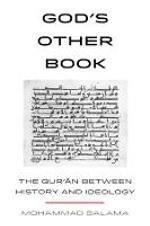In God’s Other Book: The Qur’an between History and Ideology, Mohammad Salama presents a powerful critique of the ways we study and analyze early Islam and its sacred text, filling a glaring hole in our understanding of this formative environment. Interrogating the ideological framework of late antiquity, Salama exposes hidden assumptions that prevent scholars from truly placing Islam in its socio-historical and cultural milieu. He also offers an alternative theoretical and practical model focused on pre-Islamic Arabic cultural production. Foregrounding the indigenous Arab community of seventh-century Hijaz, Salama demonstrates how the Qur’an played an organic role in commenting on, interacting with, and taking sides concerning matters of ethnicity, ethics, dress codes, and social habits. While the study delves into the past, it carries implications for the future: only with renewed attention to the Qur’an itself, in all of its splendor and intricacy, can Western readers engage thoughtfully and ethically not only with Islamic studies but also with the cultures and traditions of those who live according to another book.

God’s other book : the Qur’an between history and ideology
ISBN: 9780520391840
Format: Paperback
Publisher: University Of California Press
Origin: US
Release Date: November, 2024


